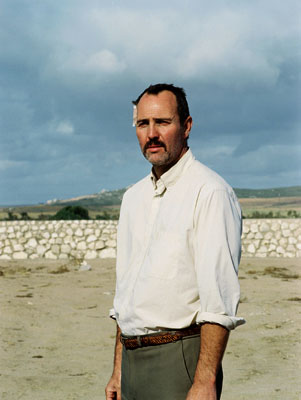|
Reviews of Recent Independent, Foreign, & Documentary Films in Theaters and DVD/Home Video
Directed by: Ian Gabriel. Produced by: Cindy Gabriel. Written by: Greg Latter. Director of Photography: Giulio Biccari. Edited by: Ronelle Loots. Music by: Philip Miller. Released by: California Newsreel. Language: English & Afrikaans with English Subtitles. Country of Origin: South Africa. 112 Minutes. Not Rated. With: Arnold Vosloo, Quanita Adams, Christo Davids, Zane Meas, Denise Newman, Elton Landrew, Lionel Newton, & Hugh Masebenza. Forgiveness starts where the recent Catch a Fire too simplistically left off, at the aftermath of South Africa’s Truth and Reconciliation Commission. Chaired by Archbishop Desmond Tutu, whose words close this film, the Commission set a unique healing model for emerging democracies and post-civil war and police states when it completed public testimony and offered amnesty in 1998. What makes this fictional story particularly human and compelling is that each character is still stunted by apartheid – there can be no reconciliation until the lying stops and all the secrets are revealed. A distraught white stranger drives into the isolated town of Paternoster on the South African Atlantic West Coast looking for a cemetery, and when he is cryptically told, “It’s back the way you came,” the stage is set for an unusual series of fraught confrontations because to him the past is still not buried. Arnold Vosloo is best known for his villains in the Mummy movies and TV’s 24. Here in his native South Africa, his haunted portrayal of ex-cop Tertius Coetzee, obsessed by his involvement in what he thought was a just war against terrorists, solidly anchors this engrossing story. Accompanied by the local priest, Coetzee has requested a meeting with the black family of dead engineering student Daniel Grootboom, but Daniel’s sister, Sannie, protests against his presence and screams to her depressed parents, “This is the man who killed your son! He put a bullet in Daniel’s head!” But he is not just a murderer reconciling to his actions, as in Dead Man Walking. Even after Daniel’s father, in denial that his son was a freedom fighter, plaintively asks Coetzee, “How did you think it was a just war,” Vosloo helps raise the film to the universality of a deluded, brutal enforcer of a questionable war, who loses his bearings when the definitions of right and wrong change around him. Meanwhile, Sannie (a dynamic Quanita Adams) alerts Daniel’s three friends and co-conspirators, white and black, to reunite for revenge. Along a dusty highway through the Karoo Desert, their hot car trip sets off mutual suspicions of whom might have informed on Daniel. Through one delay after another, suspense steadily builds by prolonging the high noon confrontation. Though Sannie's younger brother, Ernest (Christo Davids), cannot contain his rage and resentment, he and Sannie resort to frantic manipulation to detain Coetzee for his upcoming rendezvous with retribution. Debut feature director Ian Gabriel sharply moves from music videos to the classic look of a John Ford Western, with dramatic use of landscape and the horizon in the desolated climax, visually set up like the gunfight at the OK Corral, and evocatively set in the cemetery where Daniel’s buried. While some of the symbolism is a bit heavy-handed, Greg Latter’s taut script broadens a domestic drama with its A Raisin in the Sun-like coping mechanisms and interplays of sibling rivalries to the stark debates of Arthur Miller’s Incident at Vichy, rooted here in each character’s personality and motives. The glaring weakness is the look of the film. While the use of digital video allowed the filmmakers to make a low-budget film flexibly on location, the transfer to 35mm is dreadful. The muddy cinematography wavers between grayish black and white with only occasional bright flower colors and natural skin tones. The score, too conventionally melodramatic, is particularly weak when compared to Tsotsi or Yesterday. However, the old R & B classic “Tell It Like It Is” is used poignantly.
With a lot less blood than Park Chanwook’s extremely metaphorical vengeance trilogy, Forgiveness examines the lasting consequences of
the cycle of revenge, and is the most moving distillation of the personal life and death repercussions of guilt, responsibility, moral choices, and, yes, forgiveness within a political context since the Israeli film Walk on Water.
|

